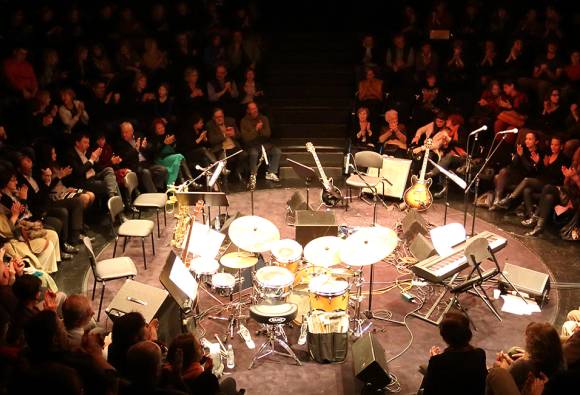
Two days of Pax Cultura
Pax Cultura – Peace through Culture / India – Fiery Stronghold of Culture
Organised by: Mednarodni kulturno-znanstveni center Pax Cultura /(International Cultural-Scientific Center Pax Cultura)
In cooperation with: Indo - European comparative linguistics, Faculty of Arts, University of Ljubljana
Pax Cultura - Peace through culture is the slogan of the peace movement that should bring peace to all nations and destroy the very possibility of war through culture. The true concept of culture must be explained again and again and implanted in human consciousness, so that humanity begins to experience it as something sacred, so that humanity never sins against cultural values and, at the same time, against the very creator and bearer of these values - the living human being. The consciousness of the world should be gained with culture, beauty and knowledge should conquer, and all-encompassing and all-understanding spirituality should win. Where there is culture, there is also peace. There is also an achievement and a real solution to the most difficult social problems. Culture is the accumulation of the highest goodness, the highest beauty, the highest knowledge.
The purpose of the event is to spread the best of ancient and modern thought in the fields of art, science and spirit, and their common beauty forms that great concept of culture that points to the salvation of all mankind. We sincerely wish that the light from the rainbow of these achievements should inspire all hearts, all nations and all religions, in brotherhood, towards peaceful development.
It is urgent that, amidst the world's confusion and turmoil, strongholds and beacons of Culture should emerge.
N. K. Roerich
India is a country of high culture, with spiritually cultivated inhabitants and accumulated knowledge that has never been lost since ancient times. Many people have experienced the magnetism of India. The secret of its great appeal lies above all in the continuity of its cultural tradition. There is no country in the world where centuries-old cultural traditions have been preserved as in India. Fate and the gods wanted to be at least one country on the planet that would be able to clearly and convincingly demonstrate the evolutionary essence of culture and beauty.
Culture and Peace—the most sacred goal of humanity! In the days of great unrest, both material and spiritual, the disturbed spirit yearns for these radiant strongholds
N. K. Rerih
PROGRAM
Friday, 22 November 2024
17:00 – 18:30
Lecture: Understanding and Appreciating Indian Classical Music and Rhythm
Rohan Dasgupta, sitar maestro & Pandit Udai Mazumdar, tabla maestro
Break: 30 minutes
19:00 – 20:30
Concert of Traditional Indian Classical Music
Rohan Dasgupta: sitar & Pandit Udai Mazumdar: tabla
Saturday, 23 November 2024
17:00 – 18:45
Lecture: The Multi-layered Messages of Indian Myths
Biljana Dušić, MD
Break: 15 minutes
19:00 – 20:30
Theatrical Performance: The Play of the Middle (Madhyamavyāyoga)
An early classical Sanskrit one-act play (3rd century CE) by the renowned Sanskrit playwright Bhāsa
Translation and direction: Assoc. Prof. Dr. Luka Repanšek, Faculty of Arts, University of Ljubljana
Performed by: Ancient Indian Theatre Group, Faculty of Arts, University of Ljubljana
Musical accompaniment: Rohan Dasgupta, sitar maestro
The performance will be conducted according to the principles of ancient Indian theatre and will be in Sanskrit with Slovenian and English subtitles.
CONTRIBUTORS
Rohan Dasgupta, sitar maestro
Pandit Udai Mazumdar, tabla maestro
Biljana Dušić, MD
Theatrical Performance: The Play of the Middle (Madhyamavyāyoga)
An early classical Sanskrit one-act play (3rd century CE) by the renowned Sanskrit playwright Bhāsa
Translation and direction: Assoc. Prof. Dr. Luka Repanšek, Faculty of Arts, University of Ljubljana
Performed by: Ancient Indian Theatre Group, Faculty of Arts, University of Ljubljana
Musical accompaniment: Rohan Dasgupta, sitar maestro
Rohan Dasgupta is a sitar maestro with nearly 30 years of dedication to the art of sitar playing. As a disciple of the rare Jafferkhani Baaj style from the Indore Gharana music school he trained under Pandit Harashankar Bhattacharya and Padma Bhushan Ustad Abdul Halim Jaffer Khan. He is renowned for his intricate technique and dynamic performances, and has received prestigious honors, including the Yadubhatta Award and the Surmani title. He has performed in over 20 countries, collaborated with international artists across genres, and presented his music and lectures at top music conservatories in Rome and Milan. In his work he fuses traditional and contemporary music, aiming to elevate the sitar as a global instrument. Rohan has been actively working in Slovenia as a lecturer and performer for several years.
********************
Pandit Udai Mazumdar, master of melody and rhythm, is a renowned tabla virtuoso of the Benares Gharana style and known for his expressive performances that blend tradition and innovation in Indian classical music. Coming from a musical family in Allahabad, his father being the pioneering guitarist Partho Sarathy Mazumdar, Udai began his musical journey with vocal training before focusing on the tabla at age seven. He studied under Pandit Ashutosh Bhattacharya and later became a disciple of Sitar maestro Pandit Ravi Shankar. Performing at prestigious venues worldwide, Udai has collaborated with legends like tabla maestro Ustad Zakir Hussain. He is also a skilled composer, with works in both traditional and contemporary music. Based in Basel and New Delhi, Udai continues to teach, compose, and perform internationally.
********************
Biljana Dušić, MD, is a physician who after nine years of working in conventional medicine noticed lack of interest in genuine health and an over-reliance on pharmaceutical drugs and technology. Due to her interest in the influence of human consciousness on the body, she distanced herself from conventional medicine. She devoted herself to the study of Sanskrit, Indian spiritual traditions and Ayurveda, the traditional Indian medicine, and opened a consultation practice focused on a holistic approach to health. She applies her knowledge in counselling and education, runs the ADITI consultation center, and organizes one-year Ayurveda training programmes.
********************
Dr. Luka Repanšek holds the Chair of Indo-European Comparative Linguistics at the Faculty of Arts, University of Ljubljana. His focus lies in the study of Ancient Indo-European languages, especially Vedic and Classical Sanskrit, Ancient Iranian languages, Celtic and Germanic. His indological works include The Vedic Prose Reader, An Anthology of Rigvedic Poetry, A Handbook of Classical Sanskrit, An Anthology of Old Indic Literature (together with V. Pacheiner Klander et al.), as well as the forthcoming translations of The Story of Nala and Bhāsaʼs Consecrations. Since 2018 he has directed a unique theater group which has staged Classical Sanskrit plays in the original Sanskrit.
Lecture: Exploring and Appreciating Indian Classical Music and Rhythm / Sitar Maestro Rohan Dasgupta & Tabla Maestro Pandit Udai Mazumdar
A form of art that has evolved over the centuries and stood the test of time and cultural changes, Indian classical music holds the collective values of tradition and creative flow. It represents a lineage without written records or archival documentation, having survived for over 6,000 years since the early Vedic times. This is due to its deep roots and connection to the flow of nature. Indian classical music has been a constant discovery of melodic and rhythmic formulas intertwined with the secrets of nature. When approached with sensibility and devotion, it has the power to transcend human minds, purify souls and creates harmony. Listening to such music is an experience in itself, but listening with a deeper understanding of its nuances makes the experience even more profound. This lecture is dedicated to fostering such an interaction, where we will follow an investigative, step-by-step process to unfold a Raga in its entirety.
****************
Lecture: The Symbolic Complexity of Indian Myths / Biljana Dušić, MD
In most myths that have been preserved from ancient times to the present day, there lies a great, often unrecognized treasure of messages and insights of our predecessors. Myths are not fairy tales. Even though they are meant to be narrated to posterity, and may be mistaken for fairy tales. Likewise myths are not to be glorified as an expression of vivid imagination of underdeveloped and primitive races of the past. They are a kind of reports, stories from ancient times, so ancient that the incredible events of that era could be preserved only as stories in myths. Mythological stories are crafted in such a unique way that they can, and often have more than one layer of meaning. Every of those layers –astronomical, geological, ethnological, psychological, cosmological, historical– offers a glimpse into facts that still remain largely hidden from modern scientific knowledge.
**************
Theatrical Performance: The Play of the Middle (Madhyamavyāyoga) / Assist. Prof. Dr. Luka Repanšek, Faculty of Arts, University of Ljubljana
The Play of the Middle (Madhyamavyāyoga) is an early Sanskrit one-act play written by the illustrious Sanskrit playwright Bhāsa (3rd c. AD). Like many of his short plays, Madhyamavyāyoga is inspired by the events described in the Mahābhārata, but this time Bhāsa attempts to stage a crucial moment in the story that actually finds no mention in the great Sanskrit epic, namely the encounter of the great Pāṇḍu warrior Bhīmasena with the half-demon and his son Ghatoṭkaca – a character that will play a decisive role in the great battle between the Pāṇḍavas and the Kauravas. The performance will be staged according to the principles of ancient Indian theater and in Sanskrit, with Slovenian and English supertitles for the audience.


Bodite med prvimi ...
.... ki boste izvedeli, katere koncerte, predavanja, gledališka in plesna gostovanja in drugo pripravljamo v Cankarjevem domu,


